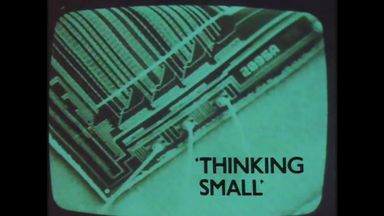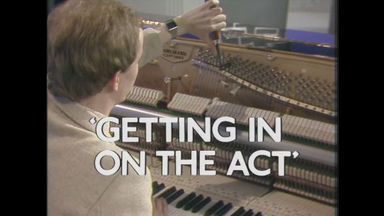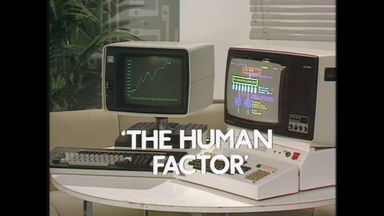Managing the Micro
5. The Human Factor
Clips from this programme
Brian Redhead charts the changes in employment over the centuries anticipating profound change now coming to the service sector
Duration: 00:53Brian Redhead puts a newly arrived word processor through its paces
Duration: 02:07Total information systems' accessing online databanks open up new possibilities for finding information - Vic Maller, Data Manager of ICL demonstrates how 'vague' searches can get results - e.g. for finding all the dukes in London.
Duration: 04:03Introducing new data processing technology at the local authority offices at Bradford City Council has meant confronting "the human factor".
Duration: 06:03Is change inevitable? In the USA Citicorp advertises 'The office of the Future. The reality is seen at the paperless offices at Citibank in New York.
Duration: 02:18The 'Office on the move" for executives is demonstrated by Mike Collins, Director of Advanced Systems at BL Systems Ltd
Duration: 02:25An analysis of who's most vulnerable as new technology changes the world of work at many levels
Duration: 05:07In the world of new technology are women at a disadvantage? Dipak Nandy of the Equal Opportunity Commission puts forward a balanced view.
Duration: 04:02Brian Redhead promotes the 1982 upcoming Computer Literacy Project
Duration: 00:28Managing the Micro
1. Thinking Small
First broadcast: 17th May 1981
Duration 24:46
BRIAN REDHEAD examines some of the implications of the new technological revolution for people in industry today. 1: Thinking Small: 'Software control' is said to be the key to the importance of 'the micro'. But what does that mean? And how is microelectronics helping small companies to stay competitive at a difficult time? Film editor M. A. C. ADAMS Producer DAVID ALLEN
2. Getting in on the Act
First broadcast: 24th May 1981
Duration 24:23
BRIAN REDHEAD examines some of the implications of the new technological revolution in industry. 2:Getting in on the Act: It is said that companies must 'think micro' because if they don't others will. But how can a micro be introduced into a new product? And how much risk is there? An electronic piano tuner, a greenhouse controller, a tape measure and a digital read-out for machine tools help show what is involved. Film editor U. A. C. ADAMS Producer DAVID ALLEN
3. Towards the Last Frontier
First broadcast: 31st May 1981
Duration 24:35
BRIAN REDHEAD examines some of the implications of the new technological revolution for people in industry today.3: Towards the Last Frontier: Britain's industrial survival may depend on the readiness of companies to adopt flexible, computer-based manfacturing methods. But flexibility is not just a matter of equipment. It's also a question of attitudes and the ability to come to terms with the human effects of change. Director: DAVID SCOTT COWAN Producer: DAVID ALLEN
4. On Line
First broadcast: 7th June 1981
Duration 24:30
BRIAN REDHEAD examines some of the implications of the new technological revolution for people in industry today. 4: On Line: Laser supermarket check-outs, new time clocks at British Leyland, and Viewdata terminals in the local garage are only the tips of a number of electronic icebergs-networks of information links which are beginning, for good or ill, to have a far-reaching effect on the high street and on white-collar jobs in industry. Director DAVID SCOTT COWAN Producer DAVID ALLEN
5. The Human Factor
First broadcast: 14th June 1981
Duration 24:27
BRIAN REDHEAD examines some of the implications of the new technological revolution. 5: The Human Factor: The office is ripe for major changes and there have already been disputes over the introduction of new equipment such as word processors. How do people react to the micro? Is the spread of the new technology inevitable? Director DAVID SCOTT COWAN Producer DAVID ALLEN
Now playing















